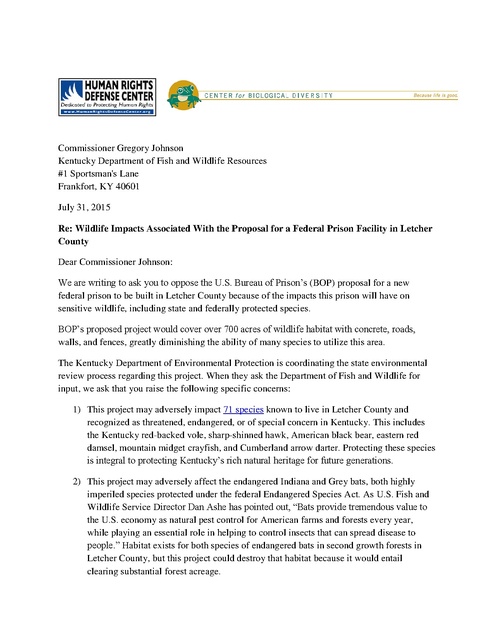Joint letter to KY environmental agencies re Letcher County BOP siting July 2015
Download original document:

Document text

Document text
This text is machine-read, and may contain errors. Check the original document to verify accuracy.
Commissioner Gregory Johnson Kentucky Department of Fish and Wildlife Resources #1 Sportsman's Lane Frankfort, KY 40601 July 31, 2015 Re: Wildlife Impacts Associated With the Proposal for a Federal Prison Facility in Letcher County Dear Commissioner Johnson: We are writing to ask you to oppose the U.S. Bureau of Prison’s (BOP) proposal for a new federal prison to be built in Letcher County because of the impacts this prison will have on sensitive wildlife, including state and federally protected species. BOP’s proposed project would cover over 700 acres of wildlife habitat with concrete, roads, walls, and fences, greatly diminishing the ability of many species to utilize this area. The Kentucky Department of Environmental Protection is coordinating the state environmental review process regarding this project. When they ask the Department of Fish and Wildlife for input, we ask that you raise the following specific concerns: 1) This project may adversely impact 71 species known to live in Letcher County and recognized as threatened, endangered, or of special concern in Kentucky. This includes the Kentucky red-backed vole, sharp-shinned hawk, American black bear, eastern red damsel, mountain midget crayfish, and Cumberland arrow darter. Protecting these species is integral to protecting Kentucky’s rich natural heritage for future generations. 2) This project may adversely affect the endangered Indiana and Grey bats, both highly imperiled species protected under the federal Endangered Species Act. As U.S. Fish and Wildlife Service Director Dan Ashe has pointed out, “Bats provide tremendous value to the U.S. economy as natural pest control for American farms and forests every year, while playing an essential role in helping to control insects that can spread disease to people.” Habitat exists for both species of endangered bats in second growth forests in Letcher County, but this project could destroy that habitat because it would entail clearing substantial forest acreage. We urge you to protect these important species by opposing this project. Our organizations are deeply concerned about the impacts of this project and were joined by nearly two dozen organizations and individuals in submitting comments outlining why this project should not go forward. These comments contain additional detail regarding our concerns with the project, including the wildlife-related issues of particular relevance for the Kentucky Department of Fish and Wildlife Resources. In closing, we once again urge you to protect Kentucky’s wildlife by opposing this new federal prison. Please confirm receipt of this letter, and do not hesitate to contact us if you would like to further discuss this matter. Sincerely, Panagioti Tsolkas Prison Ecology Project Director Human Rights Defense Center 561-360-2523 ptsolkas@prisonlegalnews.org Lori Ann Burd Environmental Health Director Center for Biological Diversity 971-717-6405 laburd@biologicaldiversity.org Commissioner R. Bruce Scott Kentucky Department for Environmental Protection 300 Fair Oaks Ln. Frankfort, KY 40601 July 31, 2015 Re: Environmental and Public Health Impacts Associated With the Proposal for a Federal Prison Facility in Letcher County Dear Commissioner Scott: We are writing to ask you to oppose the U.S. Bureau of Prison’s (BOP) proposal for a new federal prison proposed to be built in Letcher County because this project will cause significant adverse impacts to the environment and public health. BOP is currently finalizing its Environmental Impact Statement (EIS) for the project and the Kentucky Department of Environmental Protection (DEP) has been charged with coordinating the state’s environmental review process. We urge you to actively oppose this project based on the following concerns: 1) Impacts on the surrounding community from the prison’s sewage and industrial waste; 2) Harms to the scenic forests, farmlands, waterways that make this area great; 3) Adverse impacts to over 70 species that are threatened, endangered, or of special concern under Kentucky law, plus federally protected Indiana and grey bats. 4) Destruction of over 700 acres of potential wildlife habitat, to be replaced with concrete, roads, walls, and fences; 5) Health concerns for prison staff and prisoners who will be reliant on a likely contaminated water source; 6) Socioeconomic impacts of this prison both on the prisoners and society at large. Your understanding and experience protecting Kentucky’s environment allows you to offer the Bureau of Prisons a vital and unique perspective on why this project should not proceed. Our organizations are deeply concerned about the impacts of this project and were joined by nearly two dozen organizations and individuals in submitting comments outlining why this project should not go forward. These comments contain additional detail regarding our concerns with the project, including the issues of particular relevance for the Kentucky Department of Environmental Protection. The public comment period on this project was preceded by several years of controversy surrounding this project in the region. The prison industry and proponents of their projects have repeatedly made unfulfilled promises of economic prosperity to local communities, but have failed to deliver on those promises. Our concerns are for the well-being of the public and the environment, both of which stand to be harmed if this new prison is built. In accordance with the duties of your office to protect and enhance Kentucky’s environment, we urge you to oppose this new federal prison. Please confirm receipt of this letter, and do not hesitate to contact us if you would like to further discuss this matter. Sincerely, Panagioti Tsolkas Prison Ecology Project Director Human Rights Defense Center 561-360-2523 ptsolkas@prisonlegalnews.org Lori Ann Burd Environmental Health Director Center for Biological Diversity 971-717-6405 laburd@biologicaldiversity.org

